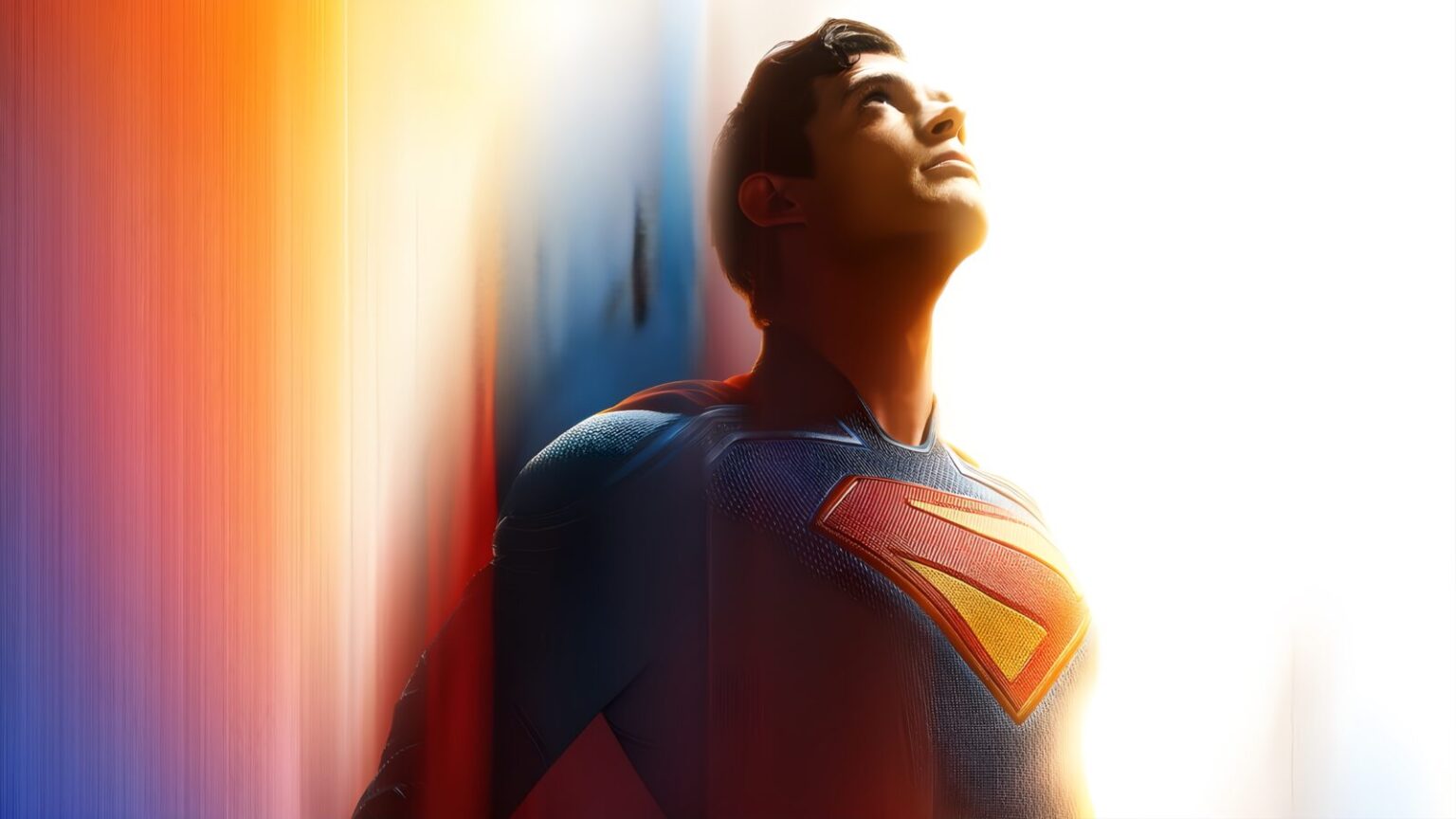TL;DR: James Gunn’s Superman is a shimmering mess of tonal joy, scattered ambitions, and heart-tugging humanity. When it’s about Lois and Clark, it soars. When it’s about everything else, it tries to juggle too many Kryptonian-sized plates.
Superman (2025)
The Weight of The Cape
There’s a funny thing about Superman. For a character who can bench press planets and speed past light, he often trips over his own shoelaces in film adaptations. I’ve lived long enough to watch him go from the saccharine perfection of Christopher Reeve to the sulky gloom of Henry Cavill’s Snyder-verse era, each iteration trying desperately to answer the question no studio executive can bear to leave unspoken: “How do you make people care about the Big Blue Boy Scout in a world obsessed with morally grey billionaires?”
That’s the question James Gunn set out to answer with Superman (2025), his inaugural offering to the newly recalibrated DCU. After sitting through two and a half hours of punchy banter, radioactive earnestness, and the most ADHD plot structure this side of a Twitter feed, I think Gunn’s answer is: “You don’t fix him. You let him be him.”
And for vast stretches of this gloriously messy film, it works.
The Most Expensive Romantic Comedy on Earth
Let’s begin with the thing everyone will talk about for decades to come: Lois and Clark are finally alive again.
I know, I know, we’ve had our Lois and Clark(s). Teri Hatcher and Dean Cain’s ‘90s TV quips. Amy Adams smouldering stoically beside a solemn Cavill. Even Margot Kidder’s hyper-verbal chaos energy alongside Reeve’s bumbling charm. But what David Corenswet and Rachel Brosnahan achieve here is something beyond chemistry. It’s… life. The ordinary, messy, unglamorous banter that blossoms into genuine intimacy.
From their first scene together, Brosnahan’s Lois radiates a fierce, investigative hunger I’ve rarely seen since His Girl Friday. You believe she’s a journalist who could outdrink you at 3am and file a Pulitzer-winning exposé by 6. Corenswet’s Clark is an earnest Kansas boy with just enough awkwardness to let you forget the CGI sculpting his shoulders into the shape of an oak tree. Their dynamic is so effortless that when Clark mutters, “Maybe that is punk rock,” after Lois’s college confessional, I almost shed a tear. Not because it’s profound – it isn’t. But because it’s human. And God, do I miss humanity in superhero movies.
The Good Boy Who Stole The Film
I would be committing cinematic treason if I didn’t talk about Krypto. Yes, Krypto the Superdog. His entrance – battered, loyal, limping beside a half-dead Superman after an offscreen beatdown – was calculated to weaponise my heart. I could almost hear the boardroom meeting that birthed him:
“Audiences liked him in the trailer. Double his screen time. Triple it if we can sell plushies.”
And you know what? Fine. Manipulate me all you want, DC. Because if there’s anything this film gets right, it’s that Superman’s story is never just about Superman. It’s about every powerless being he protects. Even the four-legged ones.
Plot: A Metahuman Three-Ring Circus
But let’s not pretend Superman is only about Lois, Clark, and their fluffy sidekick. Because for every tender Daily Planet scene, there’s a frenetic Justice Gang cameo, an alien genocide subplot, or a Lex Luthor master plan stuffed in like leftover pizza in an overfilled fridge.
Imagine opening your favourite Superman comic – All-Star Superman, perhaps, or John Byrne’s 1986 reimagining – and suddenly discovering half a Guardians of the Galaxy script taped into the margins. That’s this film. It’s a three-ring circus of tonal shifts, with Nathan Fillion’s Guy Gardner/Green Lantern swaggering through scenes like an intergalactic frat bro, Isabela Merced’s Hawkgirl flapping her wings in awkwardly framed CG set pieces, and Edi Gathegi’s Mr. Terrific deploying Yondu-like T-Sphere attacks with all the snarky efficiency of a tech startup manager.
At times, it’s thrilling – like stepping into the middle of an ongoing comic run and relishing the chaos. At others, it’s headache-inducing. The film’s third act tries to juggle Lex’s inferiority complex, metahuman politics, the ethics of drone warfare, an alien genocide allegory, and Superman’s quest to get home in time for Lois to say “I love you too.” I nearly sprained my frontal lobe trying to keep up.
Lex Luthor – The Billionaire Narcissist We Deserve
Nicholas Hoult’s Lex is the villain this age deserves: an eerily plausible mix of Elon Musk’s insecure PR flops and Jeff Bezos’s megalomaniacal futurism. He oozes smugness, the kind that makes you want to throw him into his own offshore prison. And that’s precisely his plan – or rather, it’s his plan for Superman.
In Gunn’s surprisingly biting commentary, Lex orchestrates an elaborate social media psyop to frame Superman as a foreign threat, manipulating American xenophobia to imprison an immigrant hero in an offshore black site. It’s the closest this film gets to Man of Steel-level philosophical ambition, but with Gunn’s signature brand of winking nihilism replaced by a flickering hope. Because despite Lex’s machinations, despite government complicity, and despite the cacophony of cameos, Superman remains unbreakable in his moral clarity.
The Musical Backbone – Williams Returns with Riffs
As an orchestral nerd raised on John Williams’s Superman theme, I cannot express the serotonin burst I felt when Gunn’s composers John Murphy and David Fleming resurrected it – this time layered with electric guitar riffs that felt like a permission slip to grin like an idiot. Every time that leitmotif soared, so did my chest. It’s a reminder that Superman’s mythos isn’t just a narrative. It’s music embedded in our cultural DNA.
A Comic Book Come to Life
If Superman has a soul, it’s Gunn’s childlike affection for comics as a medium. Unlike the Snyderverse, which often felt embarrassed by capes and cowls, Gunn treats them as sacred relics of joyful storytelling. His camera sweeps across Metropolis like an old school Superman: The Animated Series episode, filled with bright primary colours, snappy character intros, and throwaway lines that feel like editor’s notes scribbled in the margins.
But herein lies the film’s greatest strength and flaw. It wants to be everything: a romantic comedy, a gritty social commentary, a metahuman team-up, a corporate universe reboot, and a faithful Superman epic. In trying to honour all these mandates, it often loses its emotional throughline.
Lois and Clark – The Final Magic Trick
And yet, whenever the film pivots back to Lois and Clark, everything else melts away. Their final scene together – him battered from battle, her hair wind-whipped from near-death rescues – isn’t about the Justice Gang or alien genocides or Lex’s fascist fantasies. It’s just about two people who love each other desperately and are terrified of what that means.
In that moment, I wasn’t watching David Corenswet playing Superman. I wasn’t watching Rachel Brosnahan playing Lois Lane. I was simply watching Superman and Lois. As though Gunn’s camera wasn’t filming actors, but conjuring myth itself.
Verdict – The Messy Majesty of Hope
James Gunn’s Superman (2025) is a beautiful mess. It juggles too many narratives, introduces too many characters, and spins too many worldbuilding plates. And yet, beneath the noise and chaos, beats the purest, kindest heart I’ve seen in a superhero film since Spider-Man: Into the Spider-Verse. For the first time in years, Superman feels like Superman again. Unapologetically good, unfashionably hopeful, and deeply, painfully human.





